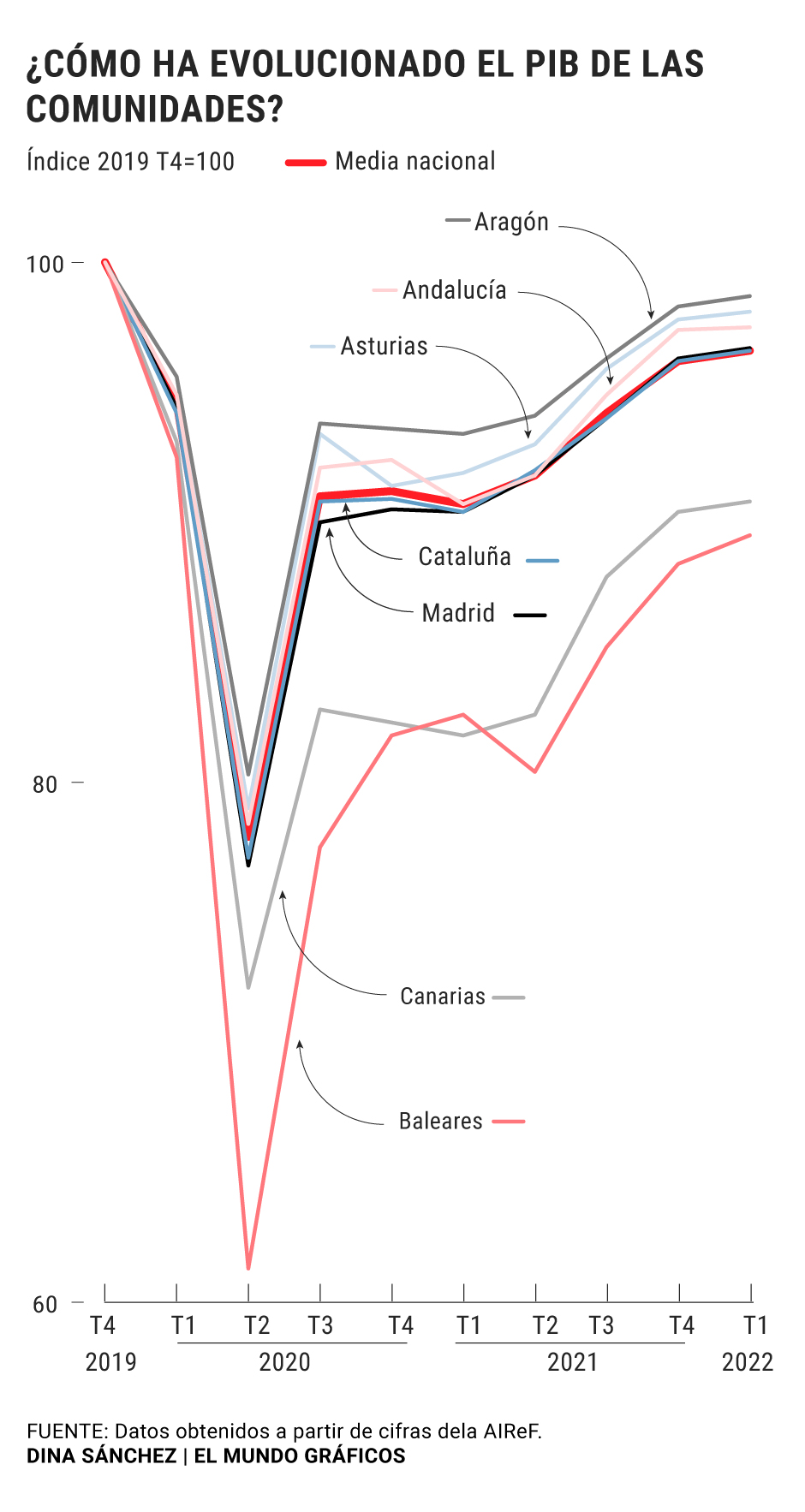Crisis The Government sinks its growth forecast almost three points and lowers it to 4.3%
Spain is far from recovering the levels of Gross Domestic Product (GDP) prior to the pandemic.
Beyond the doubts that the Government has about the results that the National Accounting of the National Institute of Statistics (INE) throws up, what the data say is that the Spanish economy has lagged behind with respect to the European recovery and, according to the Ministry of Economy, will not return to the point of origin, to 2019, until the first half of 2023. And within that delay, there are two communities that base their economy too much on tourism and that are especially off the hook: the Balearic Islands and the Canary Islands.
Based on data from the Independent Authority for Fiscal Responsibility (AIReF) at the end of the first quarter, it can be seen that the GDP of the Balearic region is more than 10 points below 2019, while in the case of the Canary Islands the difference exceeds nine points.
These figures contrast and, at the same time, weigh down those of Spain as a whole, which at the end of the first quarter were still more than four points below the level prior to the coronavirus.
These same data show that in the first quarters of the coronavirus, when economic activity was very limited and even nil at times, it was
a particularly strong blow to the two
island economies.
Those were the months in which tourism came to a complete standstill, and the result is that the economies of the Balearic and Canary Islands collapsed.
Now, on the other hand,
both regions are among the fastest growing
.
According to the same AIReF estimates, the GDP of the Balearic Islands grew by 1.2% in the first quarter, while that of the Canary Islands was close to a 1% upturn.
In Spain as a whole the advance was barely 0.3%, a poor figure, which was well below forecasts and which negatively surprised the Executive itself.
But those of the Canary Islands and Balares are still insufficient values to cut the large negative gap that they accumulated in previous quarters.
For all these reasons, and although they are not among the regional economies that weigh the most, the two regions that trust their economy to tourism are the ones that are least helping Spain as a whole to grow.
And, at the same time, they are an
example taken to the extreme
of why the Spanish economy has suffered the crisis to a greater extent than the rest of the European countries.
On the opposite side, among the communities that are contributing the most, some names stand out that could surprise:
Aragón, Castilla-La Mancha or Asturias
, in addition to the Valencian Community or Navarra.
Madrid and Catalonia, which are the regions that weigh the most in the national economy, are very close to each other and, also, very much in line with the average for Spain.
And Andalusia, which also has a significant weight on the total, is clearly ahead.
Concern about inflation
Much of this complex economic situation, not only in the island communities but in Spain as a whole, is aggravated by
inflation
.
In fact, according to data from the last quarter, consumption suffered a historic collapse, showing that families are limiting their consumption.
And surveys and studies, such as the one published yesterday by the research company Ipsos, only confirm this situation.
Concern about inflation grew by 21% in April, and is in
second place among the main problems
of the Spanish.
Thus, for 34% of Spaniards the escalation of prices is their main concern, a percentage lower than the 46% of Spaniards who continue to have unemployment as their main concern.
"The rise in the price of energy and raw materials and the effects of the war in Ukraine have caused inflation to skyrocket," they explained from Ipsos.
"For their part, consumers have been noticing this rise in costs in their pockets for weeks and
are increasingly concerned
about the impact on their personal finances," they added, according to Europa Press.
Conforms to The Trust Project criteria
Know more
Crisis
Tourism

